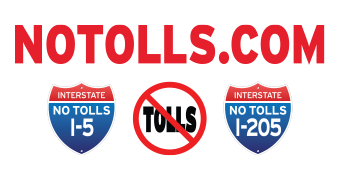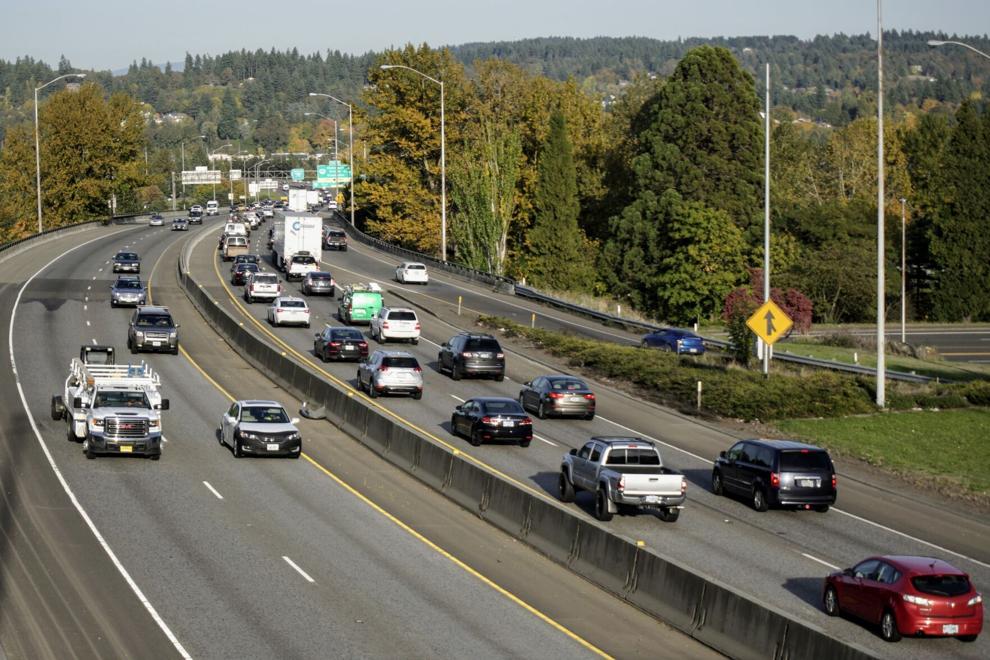Why didn’t ODOT include a non-tolling option for consideration in the project’s impact assessment?
By Cam Gilmore — Canby Herald
May 4, 2023 (updated May 8th)
In what can only be described as relief to Clackamas County residents and other users of Interstate 205, Gov. Tina Kotek’s order will delay tolls on the I-205 Toll Project until Jan. 1, 2026. Hopefully this relief isn’t temporary.
In the absence of the governor’s action, tolls to fund project construction and toll operations could have begun as early as next year. This is despite the next step in the project approval process being the Federal Highway Administration agreeing with the Oregon Department of Transportation that the Toll Project has no significant impacts.
This is called a Finding of No Significant Impacts. At this time it is unknown whether ODOT has been told to stop project development work as a result of the order. If this is the case, the project cost will be increased significantly. The project schedule called for completion in 2027.
The order creates a Special Subcommittee on Transportation Planning that will review tolling, specifically the I-205 project. The governor’s action could not have been more timely. Elected officials in cities in the project area and citizens have expressed concerns about the project that have gone unanswered. The Special Committee hearing these concerns will hopefully listen and take action.
The Oregon Department of Transportation released in February what is called an Environmental Assessment for the I-205 Toll Project. EAs address beneficial and adverse impacts not only on the natural environment, but also economic and social project impacts.
The public review period for the EA ended on April 21, and ODOT was in the process of reviewing comments made on the assessment when the governor paused the project until Jan. 2, 2026. The project schedule called for project approval by the Federal Highway Administration this summer and construction beginning in 2025.
Much has already been written in this publication and other media outlets in recent months that expressed concerns about tolling I-205, and state highways in general, in the years ahead. Thankfully, those concerns got the attention of Gov. Kotek. The governor’s letter even reached national media outlets, as pausing major projects that are nearing final approval is uncommon.
Gas tax increases in recent years substantially grew ODOT revenue, potentially allowing for a non-tolling funding option to pay for the additional lanes, which when built, will reduce congestion.
Many questions and concerns need to be addressed by the Special Subcommittee on Transportation Planning. Here are a few of those:
Why didn’t ODOT include a non-tolling option for consideration in the project’s impact assessment? A project funded with traditional sources of revenue needs to be compared to one funded with tolls. A project without tolls will have significantly less impacts on freeway users and nearby communities. As already mentioned, ODOT was only months away from seeking approval from the Federal Highway Administration to proceed with a toll-only project. Thank goodness the governor delayed this. Gas tax increases in recent years substantially grew ODOT revenue, potentially allowing for a non-tolling funding option to pay for the additional lanes, which when built, will reduce congestion. It was disingenuous for ODOT to ignore how projects have been funded in the past. Tolls are not needed on I-205 to reduce congestion. Adding freeway lanes will do this. Had this funding source been considered for the project, neither governor’s pause nor the appointment of a Special Committee would have been necessary.
Since an alternative to pay for the project with existing state and federal revenue sources was not studied, or an alternative that would involve raising the gas tax was not addressed in the EA, a comparison of project benefits and costs was not included in the project assessment. Directing ODOT and gaining the governor’s concurrence to do this should be a first order of business of the Special Committee’s work.
Why do this comparison? Many of us don’t realize that out of thousands of dollars we pay to own and operate our vehicles, only a small fraction of that amount is for state gas taxes, now at 38 cents per gallon. The average vehicle owner will pay $228 a year in these taxes to drive on the entire state and local transportation system, about 3% of their total car cost. Proposed tolls, now paused, would cost freeway users at least triple that amount to make just a 14-mile round trip on I-205 through the 7-mile section between the Highway 213 and the Tualatin River Bridge.
Where is the body of work on tolling from the legislative taskforce called for in House Bill 2017, passed by the 2017 Legislature? With over six years to collaboratively assess the situation, what were the committee’s conclusions; what process was used by the committee to inform and engage the public; what direction was given to ODOT; where are the committee’s reports; and, what costs have been incurred to date? How many staff has ODOT added and how much has been spent in implementing the legislature’s instructions to pursue tolling on state highways?
The Special Committee should be able to complete its work in six months, so why was the project put on hold for more than two years? After all, ODOT just spent two years on an extensive environmental assessment process that involved numerous committees staffed by ODOT, and use of consultants who produced hundreds of pages of technical reports. Since the freeway project has been estimated to cost $500-$800 million, and the cost of the pause could increase the project cost by at least $80,000 a day, it is imperative the Special Committee finish its work quickly.
Yes, many will agree wholeheartedly with Gov. Kotek that after six years, millions of dollars spent, and Legislative oversight of this particular project, the public’s needs have not been served in a satisfactory manner by ODOT, the Oregon Transportation Commission, or the previous oversight committee. The Special Committee on Transportation Planning should correct this as soon as possible.
This is about tolling a freeway in the wrong place with toll costs out of reach for most people. Gov. Kotek’s call for review should be carried out swiftly, direct ODOT to fund the project with existing revenue sources or with less expensive new taxes, not tolls, and take advantage of the work done to date.
Cam Gilmour is retired from serving as ODOT’s deputy director of finance and administration, Clackamas County’s director of transportation and development and the state of Washington’s transportation department’s chief operating officer.


